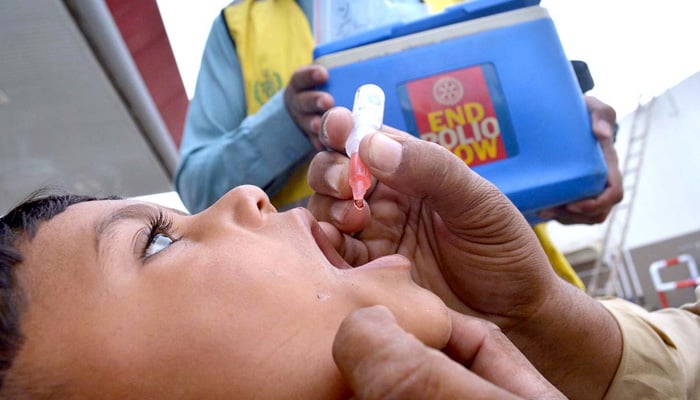WHO identifies refusals, lack of female frontline workers as reasons for back-to-back polio cases
Pakistan reported another polio case from the Mir Ali area of North Waziristan on Friday
The emergency committee of the World Health Organisation (WHO) on the international spread of poliovirus has declared community resistance with refusals to vaccination (including vaccination boycotts and fake finger-marking without vaccination), lack of female frontline workers, high turnover of frontline workers, weak health infrastructure and weak service delivery as major factors that caused back-to-back emergence of polio cases in North Waziristan of Pakistan.
As the statement of the thirty-second Polio IHR Emergency Committee of WHO was released, authorities in Pakistan reported another polio case from the Mir Ali area of North Waziristan on Friday where an eight-month-old child was found to be affected by Wild Polio Virus 1 (WPV1), raising the number of polio cases to 11 in the country in 2022 so far.
The committee meeting, which was convened by WHO Director General Dr Tedros Adhanom Ghebreyesus, expressed concern over the recent outbreak of WPV1 in North Waziristan district in southern Khyber Pakhtunkhwa (KP) in Pakistan.
Since the last emergency committee meeting in February 2022, Pakistan has reported 11 WPV1 cases from North Waziristan and two WPV1 positive environmental samples from the neighbouring district of Bannu.
“With the ongoing WPV1 circulation in South KP, the risk to the rest of Pakistan has escalated”, the emergency committee warned and said key challenges which hampered progress in polio eradication in southern KP included complex security situation, specifically in North and South Waziristan, which resulted in inadequate access of children to immunisation facilities, and reduced quality of supplementary immunisation activities (SIAs).
“Community resistance with refusals to vaccination (including vaccination boycotts and fake finger-marking without vaccination), lack of female frontline workers and high turnover of frontline workers, and weak health infrastructure and service delivery all pose challenges,” the statement read, adding that the 10 WPV1 cases reported in 2022 had zero dose of routine immunisation, zero dose or under-immunised in SIAs, and belonged to families that had refused their immunisation.
The committee observed that another challenge in south KP was the sub-optimal routine immunisation. The emergency committee commended the dedication of frontline health workers who continued to seek every child needing vaccination and also extended sympathy to the families of the 17 health workers who were killed in February 2022 in Takhar and Kunduz in Afghanistan.
The WHO body also observed that there had been a continuous progress in the eradication of polio in the rest of Pakistan with no WPV1 detection during the last 11 months. Last WPV1 case and positive environmental sample in the country outside of South KP were detected in January 2021 and July 2021 respectively.
The committee recommended that the current outbreak of WPV1 in Pakistan where there have been 11 cases in just the last three month must be contained. It warned that high-risk mobile populations in Pakistan such as migrants, nomads, displaced populations, particularly Afghan refugees, represented a specific risk of international spread.
-
 Kanye West's Last Measure To Save Bianca Censori Marriage As He Tries To Salvage Image
Kanye West's Last Measure To Save Bianca Censori Marriage As He Tries To Salvage Image -
 Kim Kardashian Finally Takes 'clear Stand' On Meghan Markle, Prince Harry
Kim Kardashian Finally Takes 'clear Stand' On Meghan Markle, Prince Harry -
 Christina Applegate Makes Rare Confession About What Inspires Her To Keep Going In Life
Christina Applegate Makes Rare Confession About What Inspires Her To Keep Going In Life -
 Patrick J. Adams Shares The Moment That Changed His Life
Patrick J. Adams Shares The Moment That Changed His Life -
 Selena Gomez Getting Divorce From Benny Blanco Over His Unhygienic Antics?
Selena Gomez Getting Divorce From Benny Blanco Over His Unhygienic Antics? -
 Meet Arvid Lindblad: Here’s Everything To Know About Youngest F1 Driver And New Face Of British Racing
Meet Arvid Lindblad: Here’s Everything To Know About Youngest F1 Driver And New Face Of British Racing -
 At Least 30 Dead After Heavy Rains Hit Southeastern Brazil, 39 Missing
At Least 30 Dead After Heavy Rains Hit Southeastern Brazil, 39 Missing -
 Courtney Love Recalls How ‘comparison’ Left Marianne Faithfull ‘broken’
Courtney Love Recalls How ‘comparison’ Left Marianne Faithfull ‘broken’ -
 Pedro Pascal Confirms Dating Rumors With Luke Evans' Former Boyfriend Rafael Olarra?
Pedro Pascal Confirms Dating Rumors With Luke Evans' Former Boyfriend Rafael Olarra? -
 Ghost's Tobias Forge Makes Big Announcement After Concluding 'Skeletour World' Tour
Ghost's Tobias Forge Makes Big Announcement After Concluding 'Skeletour World' Tour -
 Katherine Short Became Vocal ‘mental Illness’ Advocate Years Before Death
Katherine Short Became Vocal ‘mental Illness’ Advocate Years Before Death -
 SK Hynix Unveils $15 Billion Semiconductor Facility Investment Plan In South Korea
SK Hynix Unveils $15 Billion Semiconductor Facility Investment Plan In South Korea -
 Buckingham Palace Shares Major Update After Meghan Markle, Harry Arrived In Jordan
Buckingham Palace Shares Major Update After Meghan Markle, Harry Arrived In Jordan -
 Demi Lovato Claims Fans Make Mental Health Struggle Easier
Demi Lovato Claims Fans Make Mental Health Struggle Easier -
 King Hospitalized In Spain, Royal Family Confirms
King Hospitalized In Spain, Royal Family Confirms -
 Japan Launches AI Robot Monk To Offer Spiritual Guidance
Japan Launches AI Robot Monk To Offer Spiritual Guidance




